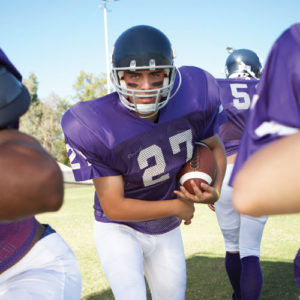With greater awareness of the risks of concussions among athletes, it’s important that coaches and parents know the signs
Contact and gymnastic sports are a huge part of life for many families. Sports such as football, soccer, and cheerleading develop physical skills, discipline, and teamwork in the young men and women who participate in them. But the threat of injury is part of the game. And whether you are coaching kids in sports or you are a parent of a young athlete, you need to be aware of the signs of a concussion so that appropriate medical attention can be sought immediately.
Coaches and parents: watch for the signs of a concussion
The major signs of a concussion are impaired mental clarity and physical stability in a young athlete. Concussed individuals may seem dazed, stunned, or confused about a play or their position on the field. They may forget instructions and seem unsure about what is going on in the game or the score.
A concussed young athlete may answer questions slowly or move clumsily. They may be unable to remember certain events before, during, or after a significant impact. Vomiting or nausea are also signs of a concussion. In very serious impacts, an athlete loses consciousness immediately or just after the incident. Even if this loss of consciousness is brief, it or any other combination of these signs needs to be addressed as soon as possible with medical attention.
Teach youth the internal symptoms of concussions
Understanding the signs of a concussion as an observer is only half the battle. You should also educate your young athletes to recognize the symptoms they might experience and let them know what to do if they think they have a problem.
Headaches and a tight, pressurized feeling in the head are common symptoms felt by concussion victims. If an individual experiences dizziness, blurred vision, or sensitivity to light or noise, he or she should be evaluated by a medical professional. Abnormal confusion, concentration loss, or lack of memory are also key indicators.
Let your athletes know that if something doesn’t quite feel right, it’s okay to be evaluated for a concussion. They should immediately bring the matter to an adult who can ensure they get the procedures and treatment they need.
What to do if an athlete is showing signs of a concussion
In the past, it wasn’t uncommon for an athlete to get “dinged,” then “shake it off” and get back into the game. Fortunately, we now understand the immense risks associated with concussions and take far greater care to protect the mental and physical health of our athletes, both young and fully-grown.
The first step is to pull an athlete away from activity right away. Until a player is seen by a medical professional, anyone showing concussion-like signs and symptoms should not be put at further risk. The potential for re-injury is high, and another concussion could seriously jeopardize the chances for a full recovery.
Next, you need to ensure the athlete receives the proper medical care. If you are a coach, immediately inform the young person’s parents about your concerns. If you are a parent, have your athlete checked by a medical professional as soon as possible, and inform the coach that your child will not be participating in sports until the medical evaluation are complete.
When is CT or MRI screening for a concussion necessary?
Most concussions do not call for a CT or MRI scan, because routine scans are often incapable of picking up evidence of mild-to-moderate injury. A 2015 study in The Journal of Neurosurgery “found that neuroimaging was normal in 78% of cases of children and adolescents with sports-related concussion.” There are, however, cases that call for advanced screening. These include injuries with the following characteristics, as featured in a research summary by momsTEAM, a resource for sports parents:
- “Whenever there is suspicion of an intracranial structural injury”
- “Loss of consciousness (LOC) for more than a minute or 30 seconds”
- “Prolonged impairment of the conscious state,” or “deteriorating level of consciousness”
- “One-sided eyelid drooping, lack of sweating on one side of the face, and sinking of one eye into the socket”
- “Severe headache”
- “Loss of coordination, or loss of fine motor control”
- “Speech or language difficulties,” poor ability to read, enunciate, write, or name objects
- “Vision changes such as reduced vision, decreased visual field, sudden vision loss, double vision”
- “Neglect or inattention to the surroundings, poor orientation to person, place, or time”
- “Poor gag reflex, swallowing difficulty, and frequent choking”
- “Significant drowsiness or difficulty awakening”
- “Seizure activity”
- Dramatic worsening of symptoms or ones that persist after 7-10 days
Complete medical screening for your young athlete
If you have any reason to believe that a young athlete may have experienced a concussion, it’s vital that he or she is examined by a qualified medical professional. And if the patient shows the signs and symptoms listed above, particularly if the injury resulted in a prolonged loss of consciousness or shows worsening symptoms, talk to your doctor about getting a scan to evaluate the situation. If you have additional questions, are wondering if someone meets the risk factors, or if you and your doctor have decided that a screening is the right option, contact POM MRI and you’ll get the information you need and the service you deserve.

